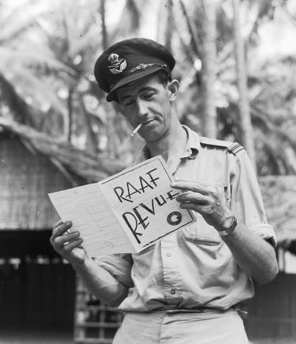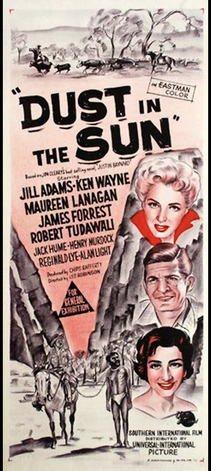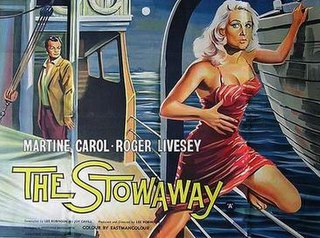Related Research Articles
Sir John Mills was an English actor who appeared in more than 120 films in a career spanning seven decades. He excelled on camera as an appealing British everyman who often portrayed guileless, wounded war heroes. In 1971, he received the Academy Award for Best Supporting Actor for his performance in Ryan's Daughter.

Jack Thompson, AM is an Australian actor and a major figure of Australian cinema, particularly Australian New Wave. He is best known for his role as a lead actor in several acclaimed Australian films, including such classics as The Club (1980), Sunday Too Far Away (1975), The Man from Snowy River (1982) and Petersen (1974). He won Cannes and AFI acting awards for the latter film.

Anna Coren is an Australian journalist and occasional news anchor who is an international correspondent with CNN based in Hong Kong.

John William Pilbean Goffage MBE, known professionally as Chips Rafferty, was an Australian actor. Called "the living symbol of the typical Australian", Rafferty's career stretched from the late 1930s until he died in 1971, and during this time he performed regularly in major Australian feature films as well as appearing in British and American productions, including The Overlanders and The Sundowners. He appeared in commercials in Britain during the late 1950s, encouraging British emigration to Australia.
The Cheaters is a 1930 Australian silent film directed by Paulette McDonagh and starring Isabel McDonagh. Phyllis McDonagh worked as art director. The McDonagh sisters made a number of self-funded films together in the late 1920s and early 1930s.
The Phantom Stockman is a 1953 Australian Western film written and directed by Lee Robinson and starring Chips Rafferty, Victoria Shaw, Max Osbiston and Guy Doleman.
Lee Robinson was an Australian producer, director and screenwriter who was Australia's most prolific filmmaker of the 1950s and part of the creative team that produced the late 1960s international hit television series Skippy the Bush Kangaroo.

Ethel Muriel Ashton, known professionally as Queenie Ashton, was a character actress, born in England, who had a long career in Australia as a theatre performer and radio personality, best known for her radio and television soap opera roles, although she did also feature briefly in films.

The Siege of Pinchgut is a 1959 British thriller filmed on location in Sydney, Australia, and directed by Harry Watt. It was the last film produced by Ealing Studios, and was entered into the 9th Berlin International Film Festival where it was nominated for the Golden Bear Award.

Justin Dallas Kurzel is an Australian film director.
King of the Coral Sea is a 1954 film starring Chips Rafferty and Charles Tingwell, directed by Lee Robinson and shot on location in Thursday Island. It was one of the most commercially successful Australian films of the 1950s and was Rod Taylor's film debut.
The Silence of Dean Maitland is a 1934 Australian film directed by Ken G. Hall, and based on Maxwell Gray's 1886 novel of the same name. It was one of the most popular Australian films of the 1930s.

Dust in the Sun is a 1958 Eastmancolor Australian mystery film adapted from the 1955 novel Justin Bayard by Jon Cleary and produced by the team of Lee Robinson and Chips Rafferty. The film stars British actress Jill Adams, Ken Wayne and an Indigenous Australian actor Robert Tudawali as Emu Foot.

The Stowaway is a 1958 French-Australian film directed by Australian director Lee Robinson and French Lebanese director Ralph Habib. It was shot on location in Tahiti and is one of the few Australian financed movies of the 1950s, although the storyline has nothing to do with Australia.
Namatjira the Painter is a 1947 documentary about the artist, Albert Namatjira. It deals with his background, his relationship with Rex Battarbee and how he learned to paint.
Outback Patrol is a 1952 documentary about the patrol of a policeman in the Northern Territory outback, Constable Robert Darkin, and the various tasks he must perform. The movie has since become a study text in Australian secondary schools. Robinson said it "was a very successful picture."

Wayne Blair is an Australian writer, actor, and director. He was on both sides of the camera in Redfern Now, and directed the feature film The Sapphires. He played a prominent role in the 2021–2024 drama series Total Control.
Adventure Unlimited is a 1965 Australian anthology TV series. It was produced by Lee Robinson and associate produced by Joy Cavill. The directors included Ken Hannam. It was made by Waratah Film Productions a short lived company that came out of an unsuccessful attempt to gain a third commercial television licence.
Bush Policemen is a 10-minute Australian documentary about the work done by a policeman in the Australian Outback. It was released to cinemas as a supporting feature. Robinson said it was "really the story of a river operating policeman."
Alan Burke was an Australian writer and film director and producer. His credits include the musical Lola Montez.
References
- ↑ "Honour For Australia's Little Films". The Sunday Herald . Sydney. 9 August 1953. p. 14. Retrieved 30 August 2015– via National library of Australia.
- ↑ "Lee Robinson interview with Albert Moran, Continuum: The Australian Journal of Media & Culture vol. 1 no 1 (1987)". Archived from the original on 1 April 2019. Retrieved 16 December 2011.
- ↑ Paul Byrnes, 'Capturing a nation's reinvention', The Sydney Morning Herald, 9 December 2004 accessed 17 December 2011
- ↑ Robinson, Lee (15 August 1976). "Lee Robinson" (Oral history). Interviewed by Graham Shirley. National Film and Sound Archive.